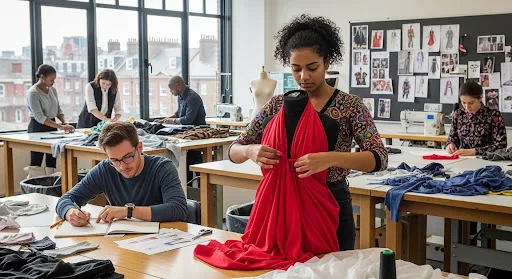Introduction
Photography has evolved far beyond a creative hobby — in the UK, it represents a thriving industry with opportunities in fashion, advertising, journalism, and digital content creation. For aspiring photographers, structured learning through photography courses provides the essential skills, technical knowledge, and professional connections to turn passion into a career. In this article, we will explore the different types of photography courses available in the UK, the career pathways they unlock, what you can expect in terms of costs and duration, and how to decide which option best suits your goals. Whether you are a beginner or aiming to refine advanced techniques, this guide offers a clear roadmap to becoming a professional photographer.
Why Take a Photography Course?
The Importance of Formal Training
While self-learning and experimentation can help, structured courses provide discipline, expert feedback, and access to industry-standard equipment. According to the UK’s Office for National Statistics, the creative industries employ over 2.3 million people, with photography playing a significant role in this expanding sector .
Benefits of Enrolling
- Technical Mastery: Learn how to handle cameras, lighting, and editing software.
- Portfolio Building: Courses often include projects and assessments that produce work for your professional portfolio.
- Industry Access: Networking with tutors, peers, and guest professionals.
- Credentials: Employers and clients often value qualifications from recognised institutions.
Types of Photography Courses in the UK
HND, BA, and MA Degrees in Photography
Universities and colleges across the UK, including institutions like the University of the Arts London (UAL) and Falmouth University, offer Higher National Diplomas (HNDs), Bachelor’s, and Master’s degrees.
- Duration: 2–4 years.
- Focus: In-depth exploration of theory, visual culture, and practice.
- Best for: Students aiming for careers in academia, fine art photography, or high-end commercial work.
Short Professional Courses
Many schools, such as the British Academy of Photography, offer intensive 8–12 week programmes.
- Duration: Weeks to a few months.
- Focus: Hands-on skills, portfolio development, and software training (e.g., Adobe Lightroom, Photoshop).
- Best for: Career changers or enthusiasts who want practical knowledge quickly.
Online Photography Courses
Platforms like Open University and FutureLearn provide online modules accessible anywhere.
- Duration: Flexible, self-paced.
- Focus: Theory, editing, or specific niches (portrait, landscape, product).
- Best for: Learners balancing studies with other commitments.
Specialist Workshops
Workshops offered by private studios or photography collectives focus on a single area, such as fashion, documentary, or wildlife photography.
- Duration: 1 day to 1 week.
- Best for: Professionals looking to refine a niche skill.
What You Will Learn in a Photography Course
Core Skills
- Camera Operations: Manual settings, exposure, shutter speed, and ISO.
- Composition and Aesthetics: Rule of thirds, framing, and storytelling.
- Lighting Techniques: Studio lighting, natural light manipulation, and flash usage.
- Post-Processing: Editing with Adobe Creative Cloud or Capture One.
Professional Development
- Portfolio Creation: Curating projects to present to clients or agencies.
- Business Skills: Marketing, contracts, and client management.
- Industry Insight: Exposure to ethical and copyright considerations.
Costs of Photography Courses in the UK
| Course Type | Average Cost (GBP) | Duration |
|---|---|---|
| University Degree | £9,250 per year | 3–4 years |
| Short Professional Course | £500 – £1,500 | 8–12 weeks |
| Online Course | £50 – £500 | Flexible |
| Workshop | £100 – £500 | 1–7 days |
(Costs vary depending on the institution and course provider. For updated tuition fees, refer to gov.uk student finance)
Career Paths After Photography Courses
Employment Opportunities
- Commercial Photography: Advertising, fashion, product shoots.
- Editorial and Journalism: Newspapers, magazines, digital platforms.
- Event Photography: Weddings, concerts, corporate events.
- Freelance Business: Independent work for agencies and clients.
Industry Outlook
According to Statista, the UK photography market was valued at over £1.6 billion in 2023 , showing steady growth in demand for skilled professionals. With digital marketing on the rise, businesses increasingly require high-quality images for branding and social media.
Choosing the Right Photography Course
Key Considerations
- Your Career Goals: Do you want to work in fashion, journalism, or freelance?
- Accreditation: Ensure the course is recognised by professional bodies such as the Royal Photographic Society.
- Flexibility: Online vs. in-person learning.
- Budget and Duration: Match the investment with your availability and financial resources.
Pros and Cons of Each Option
- University Degrees
- Pros: Comprehensive, credible, access to facilities.
- Cons: Expensive, time-intensive.
- Short Courses
- Pros: Affordable, quick results.
- Cons: Limited theoretical depth.
- Online Courses
- Pros: Flexible, accessible anywhere.
- Cons: Less networking, self-discipline required.
- Workshops
- Pros: Practical, niche skills.
- Cons: Not a full qualification.
Conclusion
Photography courses in the UK provide more than technical training — they open doors to creative careers and professional recognition. From full university degrees to short online workshops, there is an option for every learner, budget, and lifestyle. By investing in the right course, you gain both skills and credibility, positioning yourself for success in a competitive but rewarding industry. If you are passionate about visual storytelling and ready to turn that passion into a career, now is the time to explore the opportunities available.
Frequently Asked Questions (FAQ)
1. Do I need a degree to become a professional photographer in the UK?
No, a degree is not mandatory, but it can boost your credibility and open doors to certain career paths. Many successful photographers build their careers through short courses and strong portfolios.
2. How much do photographers typically earn in the UK?
Earnings vary by niche. According to Prospects.ac.uk, freelance photographers may earn between £20,000–£35,000 annually, while high-end commercial or editorial photographers can earn significantly more.
3. Are online photography courses recognised by employers?
Recognition depends on the provider. Courses from respected institutions or accredited organisations are more likely to be valued by employers.
4. What equipment do I need before starting a course?
Most beginner courses recommend a DSLR or mirrorless camera. Some universities and workshops provide equipment, while online courses may require you to own one.
5. How do I build a portfolio as a beginner?
Start by practising with personal projects and course assignments. Include a variety of themes — portraits, landscapes, events — to showcase your versatility. Over time, refine it to match your target industry.


 The Foundations: What Your Portfolio Must Include
The Foundations: What Your Portfolio Must Include  Graphic Design Courses in the UK: Learn from the Best Professionals
Graphic Design Courses in the UK: Learn from the Best Professionals  Fashion and Style Training: Fashion Design Courses in the UK
Fashion and Style Training: Fashion Design Courses in the UK